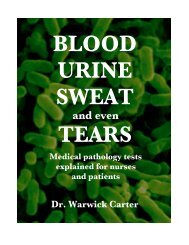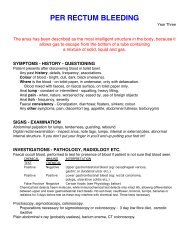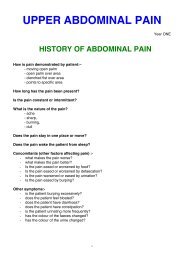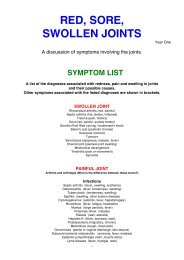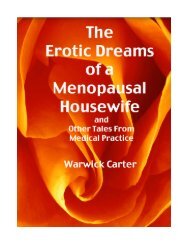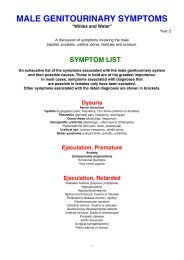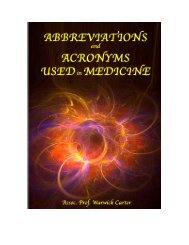Menopause A to Z.pdf - Medwords.com.au
Menopause A to Z.pdf - Medwords.com.au
Menopause A to Z.pdf - Medwords.com.au
Create successful ePaper yourself
Turn your PDF publications into a flip-book with our unique Google optimized e-Paper software.
MENOPAUSE A <strong>to</strong> Z<br />
LUTEINISING HORMONE<br />
Luteinising hormone (LH) is released from the pituitary gland in the brain. It is responsible for controlling ovulation,<br />
oestrogen production and maintenance of a pregnancy in the female, and stimulates sperm production and production<br />
of tes<strong>to</strong>sterone in the male testes.<br />
The level of LH in blood can be measured <strong>to</strong> investigate menstrual cycle disorders and infertility. Normal results<br />
vary between labora<strong>to</strong>ries, but a representative range is:-<br />
Before puberty<br />
Male<br />
Fertile female<br />
At time of ovulation in females<br />
After menop<strong>au</strong>se<br />
1 <strong>to</strong> 3.4 IU/L.<br />
2 <strong>to</strong> 9 IU/L.<br />
2 <strong>to</strong> 20 IU/L.<br />
10 <strong>to</strong> 50 IU/L.<br />
30 <strong>to</strong> 200 IU/L.<br />
Low levels may indicate infertility or hypogonadism (ovary or testicle not functioning properly <strong>to</strong> produce sex<br />
hormones). High levels may indicate that the test was taken at the time of ovulation, the child may be having a<br />
premature puberty, or the Stein-Leventhal syndrome.<br />
See also FOLLICLE STIMULATING HORMONE; GONADOTROPHINS; PITUITARY GLAND; SEX HORMONES;<br />
MALE MENOPAUSE<br />
See ANDROPAUSE<br />
MAMMARY DYSPLASIA<br />
Mammary dysplasia is also known as chronic cystic mastitis and fibrocystic disease of the breast. It is a <strong>com</strong>mon<br />
c<strong>au</strong>se of breast lumps and cysts, and breast dis<strong>com</strong>fort in middle-aged women, and is c<strong>au</strong>sed by overactivity of the<br />
ovaries in producing <strong>to</strong>o much oestrogen. It is often an inherited characteristic.<br />
Affected women develop multiple, tender, painful, small lumps in the breasts that vary in size and severity with the<br />
monthly hormonal cycle. They are usually worse just before a menstrual period. Large cysts may form permanently in<br />
the breast, and persistent pain and dis<strong>com</strong>fort may significantly affect the woman’s lifestyle.<br />
Mammography (breast x-ray) and ultrasound may be used initially, but in most cases needle or surgical biopsy is<br />
necessary <strong>to</strong> confirm the diagnosis.<br />
Initially a firm bra should be worn day and night. Individual cysts may be drained through a needle when they<br />
be<strong>com</strong>e <strong>to</strong>o large or un<strong>com</strong>fortable. Medical treatment involves using drugs such as the contraceptive pill <strong>to</strong> regulate<br />
the menstrual cycle, nonsteroidal anti-inflamma<strong>to</strong>ries, danazol and proges<strong>to</strong>gens. Avoiding caffeine helps some<br />
patients. The condition often persists until menop<strong>au</strong>se, when it naturally subsides.<br />
See also BREAST CANCER<br />
MEMORY DISTURBANCE<br />
Memory disturbance is different <strong>to</strong> memory loss (amnesia). In this section c<strong>au</strong>ses of abnormal or inappropriate<br />
memories are discussed.<br />
Dementia is c<strong>au</strong>sed by degeneration of the brain in old age, and is associated with abnormal thought processes,<br />
poor memory and hallucinations.<br />
Alzheimer disease (senile dementia or second childhood), is one of the most <strong>com</strong>mon forms of dementia in the<br />
elderly, and is characterised by loss of recent memory, loss of initiative, reduced physical activity, confusion, loss of<br />
orientation (patients be<strong>com</strong>e confused about where they are and dates), and then it gradually progresses <strong>to</strong> loss of<br />
speech, difficulty in swallowing (drooling results), stiff muscles, incontinence of both faeces and urine, and a bedridden<br />
state in which the patients are <strong>to</strong>tally unaware of themselves or anything that is happening around them. It is c<strong>au</strong>sed by<br />
a faster than normal loss of nerve cells in the brain.<br />
The female sex hormone, oestrogen, has an effect upon every cell in the body, not just the breast, uterus and other<br />
reproductive organs. During and after the menop<strong>au</strong>se, the levels of oestrogen fluctuate irregularly, and then it<br />
disappears al<strong>to</strong>gether. A lack of oestrogen will have effects on the brain that include memory disturbances. Hormone<br />
replacement therapy can correct the problem.<br />
The organic brain syndrome is a result of severe emotional disturbance (eg. horror, fear) and c<strong>au</strong>ses memory<br />
disturbances, disorientation, poor logic and behavioural changes. Drug use, epilepsy, cancer outside the head and<br />
severe infections may also trigger this syndrome.<br />
Some illegal drugs (eg. heroin, marijuana) and prescribed narcotics and sedatives may affect memory. Long-term<br />
alcoholism may c<strong>au</strong>se memory disturbances.<br />
MENOPAUSE, MALE<br />
See ANDROPAUSE<br />
29



